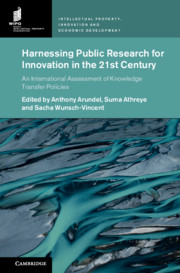Intellectual property (IP) is at the heart of modern economic life. In many countries, investment in intangible assets is growing faster than investment in tangible assets. Policy makers – whether in rich or poor economies – seek to promote an IP framework that is conducive to innovation and economic growth.
The series Intellectual Property, Innovation, and Economic Development intends to inform such policy initiatives through rigorous scholarship. Each book in the series examines a major aspect of the interface between IP, innovation and economic development. Economic analysis is complemented by contributions from other academic disciplines to present the latest scholarship and consider its real-world implications. The series builds on studies by the World Intellectual Property Organization, reflecting the research interests of the international policy-making community.
Carsten Fink, Chief Economist, World Intellectual Property Organization Series Editor
Editorial Advisory Board
Megan Macgarvie, Associate Professor, Markets, Public Policy and Law, Questrom School of Business, Boston University, USA
Beth Webster, Director of the Centre for Transformative Innovation, Professor and Pro Vice-Chancellor for Research Impact and Policy, Swinburne University, Melbourne, Australia
Mark Wu, Henry L. Stimson Professor, Harvard Law School, Faculty Director, Berkman Klein Center for Internet and Society, USA

